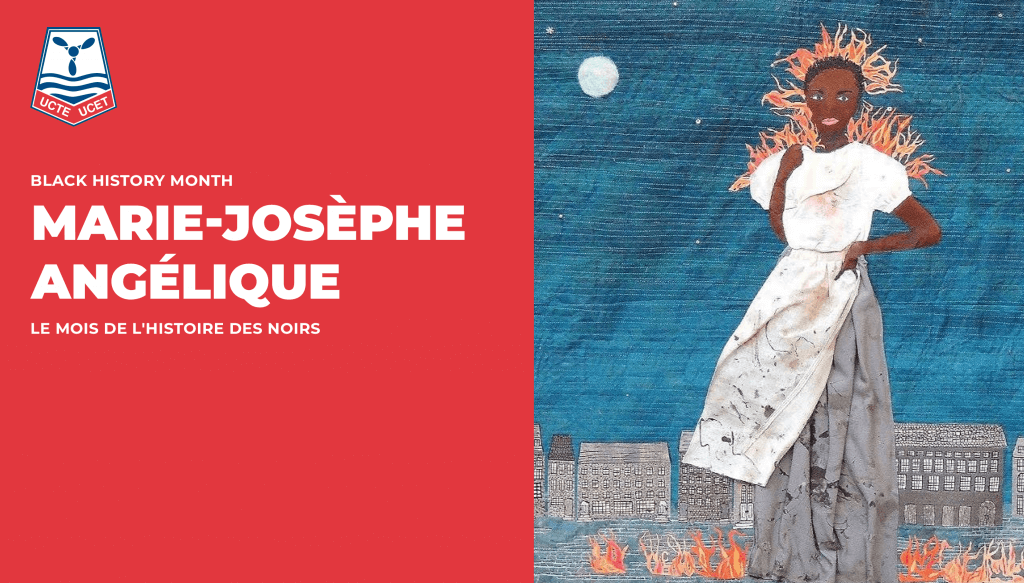Black History Month – The Story of Marie-Josèphe Angélique
To conclude Black History Month, UCTE would like to take the time to go back to the very beginning of the rebellions of the 1700s. Canada was one of the countries that used slavery. In the 1600s, there were 4,200 slaves in New France (two-thirds Aboriginal and one-third Black). By the late 1700s, the British had brought another 3,000 unpaid workers to Canada[1]. Marie-Josèphe Angélique was one of these slaves, and we want to tell you her story.
Born in 1705 in Madeira, Portugal, she arrived in Montreal at the age of 20 as the slave of Thérèse de Couagne de Francheville. We have few details about the first 20 years of her life. Marie-Josèphe Angélique’s first owner sold her to François Poulin de Francheville who died in 1733. Marie-Josèphe then became the property of François’s widow, with whom she lived for nine years. In the meantime, she gave birth to three children, none of whom survived infancy. According to rumours at the time, she and another slave were forced by their owners to produce children.
During these nine difficult years, Marie-Josèphe Angélique also had a lover, a white hired hand named Claude Thibault. In December of 1733, she asked Madame de Francheville for her freedom, which was refused. Marie-Josèphe Angélique then rebelled. Her drive for freedom was met with resistance and threats.
Marie-Josèphe Angélique responded by threatening to kill her mistress by “roasting” her. She also said she would “roast” other servants in the household, making daily life so unbearable for one Marie-Louise Poirier that she resigned[2].
In 1734, Madame de Francheville sold Marie-Josèphe Angélique to François-Étienne Cugnet. During the winter, slaves could not depart by boat. When Marie-Josèphe Angélique learned that she would be sold again, she declared that she would set the house on fire. With her lover, Claude Thibault, she planned an escape and return to Portugal.
Madame de Francheville had been temporarily lodging the couple in the residence of Alexis Monière. They set fire to Marie-Josèphe Angélique’s bed.
They sought to flee on the first ship bound for New England. No ship was set to sail for Europe, and Claude and Marie-Josèphe Angélique were captured by police near Chambly two weeks after their escape. Claude Thibault was imprisoned and Marie-Josèphe Angélique was returned to her owner.
Determined to regain her freedom, she threatened to burn down the residence of her mistress. On the evening of Saturday, April 10, 1734, a large part of Montreal’s merchant district was destroyed by fire. At least 46 buildings, most of them residences, burned, in addition to the convent and the hospital, Hôtel-Dieu de Montréal. Marie-Josèphe Angélique was accused of arson. Several witnesses affirmed that it was she who set the fire. Following a six-week trial, one of the most spectacular of the 18th century in Canada, she was found guilty and sentenced to death. Her hands were cut off and she was burned alive. Throughout her, she proclaimed her innocence. On the morning of June 21, 1734, under torture, she confessed, but refused to name Claude Thibault as her accomplice.
Marie-Josèphe Angélique has left her mark on history, which is replete with stories of the horrors experienced by slaves in Canada over a term of more than 200 years. Marie-Josèphe Angélique’s guilt was never proven. Being a slave, black, poor and foreign made her a scapegoat. With two attempts to gain her freedom, Marie-Josèphe Angélique became a symbol of resistance. In February of 2012, the public square in front of Montreal City Hall was named Place Marie-Josèphe Angélique in her honour. In addition, a book was written to tell her story, The Hanging of Angélique (2006).

Active History
[1] https://psacunion.ca/moments-canadian-history-black-labour?_ga=2.175617122.1730077832.1645719728-1476688755.1636553290
[2] https://www.thecanadianencyclopedia.ca/en/article/marie-joseph-angelique
